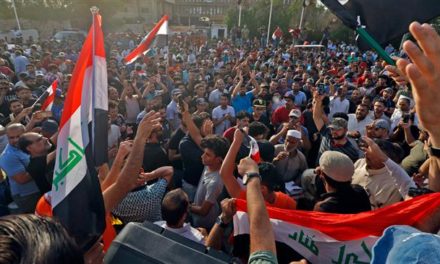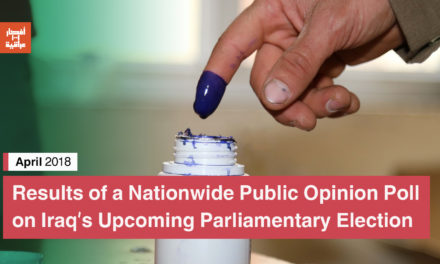The election campaign in Iraq this year has been quite intense to put it mildly. If there is anything that Iraqis do so well, it is to be palpably passionate about where they stand regarding issues that matter the most to them. Boycotters were incredibly passionate about their decision to abstain from voting and participants were also incredibly passionate about their decision to vote. Basically we have been on an emotional roller coaster since the beginning of 2018, and it culminated on May 12th when Iraqis cast their votes in an election that was hailed by most observers and analysts as being free and peaceful.
This has been an extremely tight race. After the announcement of the final results by the Independent High Electoral Commission, three blocs came ahead: Sairoon won 54 seats, Fateh won 48 seats and Nasr won 42 seats. No bloc has an outright majority, which is 165 out of a total 329 seats, to form a government on its own. Therefore winning blocs will have to forge alliances and reach out to their competitors before we can actually see the formation of a new government.
Post-election period should be a time for quiet reflection and recalculation, for both political parties and the electorate as well. Winning parties and their voters get to celebrate and rejoice, while losing parties and their voters retreat to assess what went wrong and try to find ways to cope and regroup.
If you are an Iraqi who has been incredibly excited about the prospect of going to the polls and casting your vote for someone who represents your vision for this country but that person whom you voted for did not win, then what should you do? What is the best way to deal with feelings of disappointment and disheartenment that are likely to follow? Let us go through what needs to be done together.
You must remember that this is certainly not the end of the world. Iraq is a democracy and free elections are held every four years. So even if your candidate did not end up winning this time around, there is a possibility they may win in four years from now. S/he is going to be fine regardless, and so are you.
Iraq has been through a lot over the course of its modern history: military coups, decades of brutal dictatorship, wars, harsh international sanctions, foreign invasion, civil conflict and terrorism. Keep telling yourself that you have managed to survive what was much worse than this and that you will surely manage to survive seeing your election candidate lose as well.
The temptation to avoid addressing your disappointment and keep going with your life as if nothing has happened can be quite strong, but at the same time it is unhealthy and self-destructive. Talk to your close circle of confidants about why you are feeling gutted and more importantly about what to do next and how to move forward. Processing your “grief” is essential to achieve acceptance.
Taking the time to listen to regular people who made electoral choices that are different from yours is also very important, as it is entirely possible to engage respectfully with people with whom you disagree without sacrificing your own integrity. Reach out to them and hear them out, listen to their reasons with an open mind and avoid judging them. Try your best to understand where they are coming from and do not dismiss them just because they have chosen to pick a candidate whose policies and/or character are not something for which you would normally go. You are Iraqi, and they are Iraqis as well.
Becoming more involved in your society is another great way of moving on from being disheartened by politics and elections. Find a worthy cause and dedicate yourself to it; look for great charities or NGOs and donate your time and/or your money to them. Being an active member of your local community is an effective way of reminding yourself to keep things in perspective: you went to the polls and cast your vote because you care about Iraq and you want what is best for yourself and your people.
And finally, you do not get to give up on Iraq and its people just because the election results may not have gone your way. Your vote did not go to waste and your participation was not in vain even if you are disappointed by the elections’ outcome. Iraqi democracy is not perfect but it is definitely something that is worth fighting for and standing by. Even if the people whom you did not vote for ended up forming the next government, then you must wish them nothing but success in their mission to govern. Their failure would compromise Iraq as a whole and may I remind you that you and your loved ones live in this country as well. Wishing them failure so that you can gloat to their voters’ faces is unpatriotic and foolish.
Iraq will outlast you and your election candidate, never lose sight of that.

Noor Ali
Noor Ali is a resident of Baghdad and is a Middle East observer, mainly focusing on Iraqi social justice & women’s rights.










